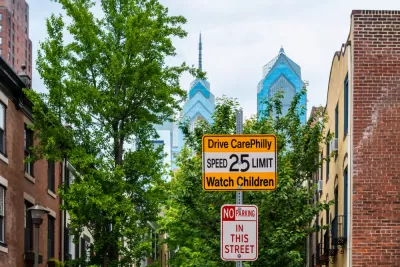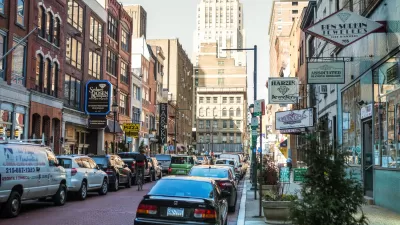It's much easier to talk the parking talk than to walk the parking walk. Philadelphia, however, is showing how to actually replace overabundant parking with walkable housing developments.

Angie Schmitt shares "some great news out of Center City Philadelphia: Housing is replacing parking."
"The number of off-street parking spaces in downtown Philly and nearby neighborhoods declined 7 percent between 2000 and 2015, from about 50,000 to 46,400," according to Schmitt. At the same time, parking occupancy rates have also fallen.
"What’s happening in Philadelphia is evidence of the 'virtuous cycle' that results from reducing dependence on cars," explains Schmitt. "Making parking less convenient is leading to greater walkability."
Schmitt then goes on to details the policies that helped Philadelphia achieve that virtuous cycle, including details on the city's approach to its parking tax, parking minimums, tax abatements, and property tax assessments.
FULL STORY: How Philadelphia Fixed Parking Craters Using Tax Policy

Montreal Mall to Become 6,000 Housing Units
Place Versailles will be transformed into a mixed-use complex over the next 25 years.

Planetizen Federal Action Tracker
A weekly monitor of how Trump’s orders and actions are impacting planners and planning in America.

DARTSpace Platform Streamlines Dallas TOD Application Process
The Dallas transit agency hopes a shorter permitting timeline will boost transit-oriented development around rail stations.

Nine Ways to Use Curb Space That Aren’t Parking
California’s new daylighting law bans parking within 20 feet of crosswalks. How can cities best use this space?

ADUs for Sale? San Diego Could Legalize Backyard Condos
As one of 25 proposed amendments, San Diego may soon allow accessory dwelling units to be bought and sold as individual homes.

Dallas Ditches Parking Minimums in 14-1 Vote
The sweeping city council decision removes set parking requirements from developments downtown, near transit, small businesses and more.
Urban Design for Planners 1: Software Tools
This six-course series explores essential urban design concepts using open source software and equips planners with the tools they need to participate fully in the urban design process.
Planning for Universal Design
Learn the tools for implementing Universal Design in planning regulations.
City of Mt Shasta
City of Camden Redevelopment Agency
City of Astoria
Transportation Research & Education Center (TREC) at Portland State University
City of Camden Redevelopment Agency
Municipality of Princeton (NJ)
Regional Transportation Commission of Southern Nevada




























